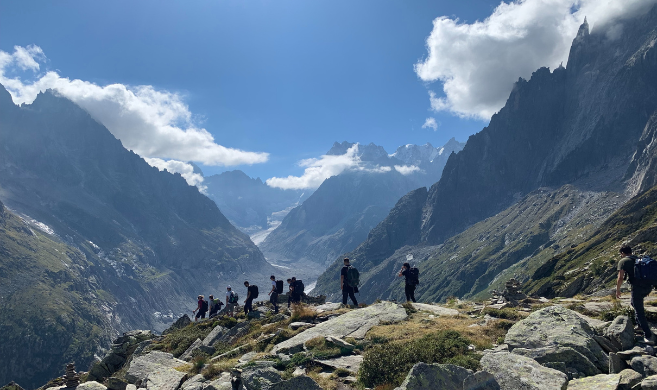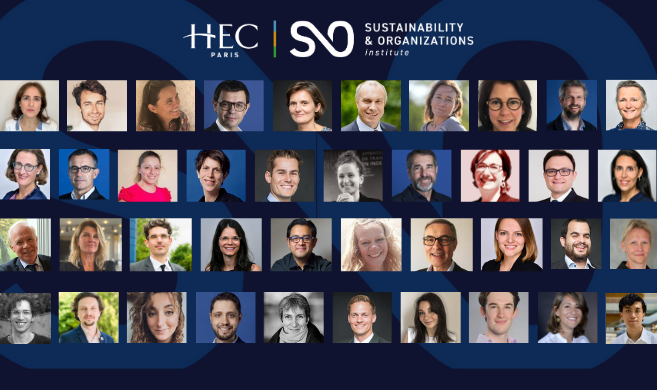What is the S&O Institute?
Rodolphe Durand, Founder and Academic Director of the S&O Institute: We bring together more than 60 professors across different disciplines from HEC and other renowned universities, including Columbia, Oxford, and Ivey. These academics study and teach ecological transition, purpose, and inclusion and are affiliated with the three S&O centers—Climate & Earth, Purpose, and Inclusive Economy.
I founded this Institute following the subprime crisis of 2008 because I firmly believe that business school professors bear a responsibility to equip current and future decision-makers with the requisite knowledge and skills to navigate complex global challenges.
However, our mission goes far beyond the traditional academia. Since 2020, the S&O team has been working hand in hand with HEC's Chief Sustainability Officer François Collin (find his interview here, Ed.) and his team to shape the school’s sustainability strategy on the objectives that we have fixed ourselves around the pillars Think, Teach, Act, Campus, and People. In essence, we are the academic linchpin of HEC's sustainability strategy regarding research, pedagogy, and actionable initiatives to drive meaningful change.
How does research conducted within S&O help decision-makers?
Cécile de Lisle, Executive Director of the S&O Institute: Between 2020 and 2022, 38% of the research articles published by HEC researchers have been dedicated to ESG topics. In addition, annual events are organized by the Institute and its centers, such as the S&O Research Day, the Purpose Day, the Inclusive Economy Day, and the Climate Day. They gather international researchers and a wide range of practitioners to exchange insights from their latest research and experiences and to facilitate the translation of research findings into actionable strategies.
Can you give examples of research that reach the private and public spheres?
Rodolphe Durand: I can name a few research studies in business strategy that affect both corporate and public leadership and policies.
On the impact of new ESG law on companies in Europe: As of January 2024, EU regulations on ESG reporting aim to improve transparency and accountability. In early 2021, the European Commission tasked Associate Professor Marieke Huysentruyt to develop those new standards with the European Financial Reporting Advisory Group (EFRAG). They also studied how these standards would affect 50,000 companies and the companies in their value chain in aspects such as recruiting, staffing, information gathering, and management of environmental, social, and governance actions.
Learn more in the article: “How will new EU ESG reporting standards affect companies?” and in this talk:
On the role of corporate purpose on performance for a higher cause: In a series of research projects with several HEC Paris PhD students across disciplines, we study the impact of corporate purpose on employee engagement using data from hundreds of companies. We find that a well-understood and perceived legitimate purpose correlates with better team coordination (+10%) and trust between members (+15%), ultimately influencing innovation, operations, and overall performance.
Learn more in the RESKILL Masterclass with Rodolphe Durand on “How Does Purpose Drive Performance?”
On impact investment in disadvantaged urban areas: With my former PhD student Romain Boulongne, now Assistant Professor at the IESE Business School, and Caroline Flammer, Professor at Columbia University, we investigated the effectiveness of impact investing in promoting both business performance and social impact, comparing French banlieues and non-banlieues ventures. We find that investments in banlieue ventures lead to greater improvements in both financial and social aspects, including creating local, quality, and gender-equitable jobs. Hence, impact investors could unlock untapped potential in banlieues, where ventures often face discrimination in traditional loan markets. Based on data from BpiFrance, the article helps understand better the consequences of impact investing for public (like BpiFrance) and private actors.
Find the research here. Learn more soon on Knowledge@HEC.
On fighting child poverty: In a study conducted with Marieke Huysentruyt and our PhD student Paul Gouvard, we could find what type of tone in emails sent to the poorest families could increase their enrolment in the “Programme Malin” to improve children’s nutrition. In 2022, the CNAF's monthly emailing campaigns were marked by the acceleration of recruitment of the program with the first impacts of informal relays on social networks, resulting in more than 100,000 families registered in the program. In 2023, the program won the “La France s’engage” competition.
Learn more in this article on Knowledge@HEC and on this video:
Are we ready to support businesses to navigate their sustainability and climate challenges?
Fernando J. Diaz Lopez, Executive Director of the S&O Climate & Earth Center: Businesses today face unprecedented risks associated with climate change and other planetary boundaries, such as shifts in land systems. The IPCC has offered irrefutable evidence of the impacts of increased GHG emissions and associated climate risks. However, the interrelated climate-biodiversity challenge presents a wealth of opportunities for companies transitioning to net-zero emissions and providing resilient goods and services. According to the OECD, the market for “climatech” solutions is around 2.7 trillion dollars, and investment in “cleantech” is rising.
Yet, many ESG-related questions and means to navigate this new business landscape remain unsolved. This is where the S&O Climate and Earth Center plays a pivotal role. Established in 2021, the center hosts a HEC Foundation award-winning Climate & Business Certificate along with four Chairs (FII Institute Chair on Business Models for the Circular Economy, Nexans Chair on Orchestrating Sustainable Business Transformation, Société Générale Chair on Energy & Finance, and CMA CGM Chair on Sustainability and Supply Chain Analytics). Together with our academic director Daniel Halbheer, we’re developing a very ambitious roadmap to position the Center as a European leader in this field.
Moreover, our school is a founding member of the Business Schools for Climate Leadership (BS4CL) partnership, alongside Cambridge Judge Business School, IE Business School, IESE Business School, IMD, INSEAD, London Business School, and Saïd Business School at Oxford University. This initiative is supporting our future business leaders to bring change in climate action. With our dean Éloïc Peyrache assuming the role of “Liaison Dean" throughout 2024-2025, we have a unique opportunity to further mainstream our climate agenda and showcase the leadership of our partners and HEC alumni. Indeed, the timing could not be better for forging new partnerships with us. Explore also our brand new executive short program: "Reshaping Business for Climate."
How can we, at HEC, accelerate the transition and help companies increase their positive impact?
Maureen Sigliano, Executive Director of the S&O Impact Company LAB: Global companies invest over 1 trillion dollars per year in social and environmental related impact initiatives. Yet the gap between investments and results is growing.
In 2023, Schneider Electric launched the Impact Company Lab within the S&O Institute to experiment and scientifically assess specific questions and create a body of compelling evidence for companies as they define and implement their agendas around impact solutions. For example, a key question is to understand the role of social capital and trust across internal, external, and local ecosystems and markets. This will be critical to understanding the 'voices of the future', building legitimacy and trust in rapidly evolving dynamics, and proactively building new resilience to navigate a just transition.
The HEC Impact Company LAB: Watch the video:
How does the transition translate in terms of teaching?
Cécile de Lisle and Isaline Rohmer, Executive Director and Interim Executive Director of the S&O Institute: Pedagogical innovation is a cornerstone of our work. Our research is infusing more and more HEC programs. The S&O Institute manages 25 in-house programs. We now have three new flagship Certificates, one for each major S&O topic: Climate & Business, Inclusive & Social Business, and Strategy for Impact, all together gathering this year around 80 participants, with over 500 alumni in total. In addition, we host the Energy & Finance Certificate, which was established 15 years ago. Further, we introduced an obligatory “Commitment track” for L3 students as part of the Grande Ecole's curriculum review in 2023.
We also provide funding for research projects, teaching assistant positions, visits from renowned speakers, and student field trips. Moreover, we publish books to make our research flow into the classroom and the economic world's practices.
One important resource we provide to the faculty is a growing number of case studies. For example, two Colas cases, one by Laurence Lehmann-Ortega and Bertrand Quélin and one by Hélène Löning, respectively, reflect upon solar-panel paved roads and carbon measurement. These cases enrich teaching for students, directly engaging with innovation and the state of the art in the business world.
Today, at the level of the Grande Ecole, 10% of teaching hours cover S&O-related topics, as do 27% and 33% of the MBA and Executive MBA teaching hours, respectively. The curriculum review for the Grande Ecole undertaken in 2023 doubles the teaching hours on sustainability topics to approximately 20%.
Meet the team:








